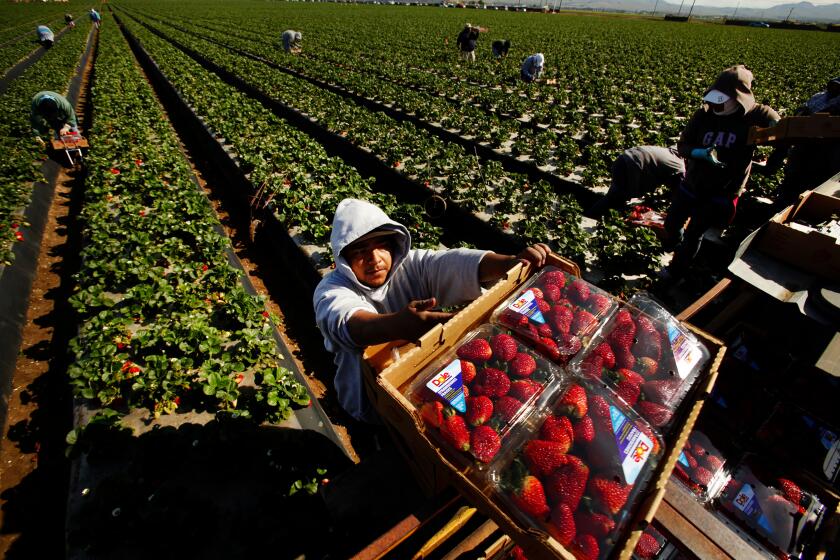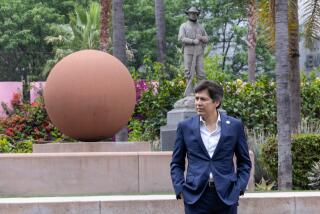Op-Ed: Remembering Marion Moses, doctor to Cesar Chavez and Dorothy Day
- Share via
Among the many remarkable people I have met during years of writing about the farmworker movement, Marion Moses stands out — not as the most accomplished, intelligent or influential, though she was all those things, but because she possessed a moral clarity and force that powered her through an extraordinary journey.
Her death last week at 84 was not big news. Stories like hers too often go untold, missed opportunities to draw inspiration from people who do not seek attention but leave the world a better place. Her legacy offers a beacon of hope and a badly needed respite in this age of anxiety. Time after time, in her determined way, Moses overcame obstacles to do good.
Born in Wheeling, W.Va., the second of eight children, Moses was the first among 68 cousins in her Lebanese immigrant family to graduate from college. When she wanted to be a doctor, her father told her that wasn’t an option for girls. She became a nurse. But Moses was not one to be bound by conventions. She ended up in Berkeley in the 1960s, just as la causa was becoming the new civil rights movement of the West. Drawn into the world of farmworker organizing, she spent five years in Cesar Chavez’s fledgling United Farm Workers union, as a nurse, boycott leader and fundraiser. Then she went to medical school.
She was 40 when she graduated. She focused on occupational medicine and the dangers posed by pesticides, particularly for farmworkers. She became prominent in that emerging field, though she is best known as the personal physician of Chavez and Catholic Worker Movement founder Dorothy Day, with whom Moses became close friends.
Moses took part in her share of historic moments. Fifty years ago this summer, she was in Room 44 of the Stardust Motel in Delano, Calif., massaging Chavez’s back as he negotiated final details of the unprecedented contracts that ended the five-year grape strike.
But her greatest impact was in the shadows, where she worked unheralded — though not unheard, because Moses was not a quiet woman. In farmworkers’ living rooms, she made friends and learned Spanish; in rural clinics, she administered drugs; and in hospital emergency rooms, she demanded that poor Mexican Americans be treated with urgency and respect, not the neglect and contempt they so often encountered.
Agricultural employers and state health authorities need to act immediately before COVID-19 becomes a major crisis among workers who provide our food supply.
“The poor are teaching us that the struggle for health care is inseparable from the struggle for human dignity,” she wrote in 1973 in the American Journal of Nursing. When she moved to Delano, she wrote, “I worried about where I would live, what I would eat, what I would do for money. I worried about inconsequential things that never concern me now.”
She shared Chavez’s conviction that sheer will and perseverance in a righteous cause could almost always triumph. She imbued that faith in people like Tom Dalzell, who was 16 years old when Moses put him on his first picket line. She lobbied for the teenager to spend the summer in Delano; he stayed with the union for eight years. “Everything I have done in work has been shaped by those years,” Dalzell, business manager for International Brotherhood of Electrical Workers Local 1245, wrote in a tribute to Moses. Even in her 80s, she “had the same passionate energy that I remembered from 1968. She was a glorious woman.”
Chavez deployed Moses to solve problems large and small. “I remember how difficult and stubborn he could be (he said the same thing about me),” she wrote. In 1969, frustrated that cooks at the union kitchen would not save scraps to feed his worm farm, Chavez dispatched Moses. From then on, the worms ate well, he recounted. “Marion has never said no to an assignment. No matter how s— it is, she gets it done.”
She treated Chavez like family, with love and loyalty, yet was fully aware of his flaws. He reciprocated. Of the many key people Chavez threw out of the union over the years, Moses was the only one I know of who was welcomed back.
Her friendships with Chavez and Day mattered to Moses not because of who they were, but what they did. She took the greatest satisfaction in having helped alleviate Chavez’s back pain so he could resume work, and in the belief of those around Day that Moses’ care added years to Day’s life.
My enduring memory is of sitting in Moses’ tiny San Francisco apartment off Golden Gate Park as she showed me photos of her younger self with Chavez and with Day. “They were my friends,” she said simply. And that was enough.
Miriam Pawel has written widely on California and agriculture. She is the author of “The Crusades of Cesar Chavez” and “The Browns of California.”
More to Read
A cure for the common opinion
Get thought-provoking perspectives with our weekly newsletter.
You may occasionally receive promotional content from the Los Angeles Times.











